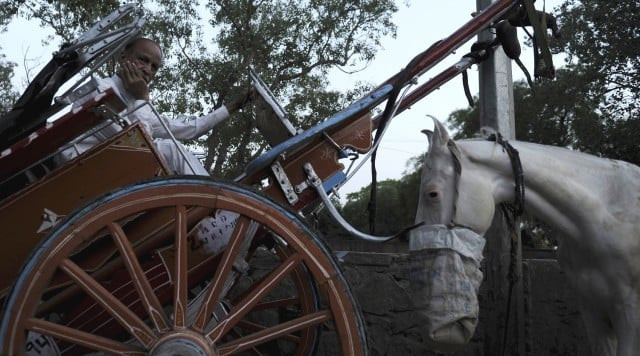Delhi’s ‘tongas’ forced to ride into the sunset

Delhi’s ‘tongas’ forced to ride into the sunset
The favoured mode of transport for the city’s elite at the height of the British Raj, the status of the iconic tongas has now officially been downgraded to “public nuisance”.
Barely 250 tongas remain in the capital, but the municipal government has ruled that — in a city of five million cars — getting rid of the carriages will somehow help ease Delhi’s chronic traffic congestion.
The decision is being challenged with a last-ditch appeal to the High Court and by a public outcry over what many see as an unnecessary effort to erase a part of the capital’s cultural heritage.
Delhi Mayor Prithvi Sawhney is unmoved.
“With traffic congestion increasing, a tonga ride is a waste of time and problematic for both passenger and driver,” Sawhney told AFP.
“In the old days, tongas were used to carry passengers. Today they just carry luggage and a few tourists. Barely anyone uses them for daily travel,” he said, adding that the new metro system had “revolutionised” transport in the city.
In the absence of any last-minute reprieve, Kishen Lal, a third-generation “tonga-wallah,” may hang up his saddle and reins on Sunday for the last time.
The government has offered the drivers a path to alternative employment in the form of a vendor’s licence, but those like Lal, who is 73, say it is far too late to change trades.
“We know no other profession except this,” said Lal, whose grandfather drove a tonga in Delhi back in the early 1940s, before independence.
“If they want to stop the tongas, they should do it in phases and not all in one go,” he said. “It will give us all great sadness if we have to stop riding tongas. They are the pride and majesty of this city.”
The decision to banish the tonga-wallahs coincides with the general facelift that Delhi is receiving ahead of the Commonwealth Games in October. The government is looking to the Games to showcase the “new India” — an emerging economic powerhouse which aspires to be the same sort of infrastructural transformation undertaken by its giant neighbour China. It’s a vision that has no place for the humble tonga — a fact that distresses people like Delhi historian and writer Radha Kumar.
“Growing up, I often used tongas to commute from Old to New Delhi. Feeding the horse was my biggest high,” recalled Kumar, while insisting that his objection to their disappearance wasn’t based on nostalgia alone. The argument that expelling several hundred horse-drawn carriages would improve traffic congestion in a city of more than 20 million souls is, Kumar argues, barely credible. “And the government has no right to make arguments or decisions on the economic viability of such a small group of people,” he said.
The High Court appeal will be heard on July 14, but the municipal government has insisted that the tongas get off the roads from Monday, having already given them a one-week stay.
“We are praying for God to intervene,” said Lal. “But in the end we will also comply with the court’s ruling.”
Published in the Express Tribune, June 6th, 2010.



















COMMENTS
Comments are moderated and generally will be posted if they are on-topic and not abusive.
For more information, please see our Comments FAQ